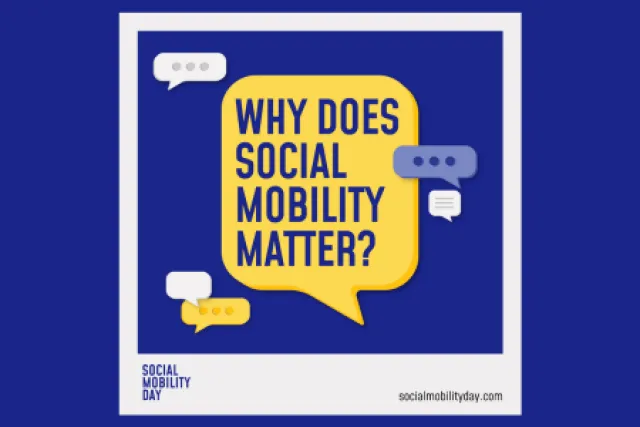Why does social mobility matter? It’s a great question, and one that is often not widely understood. Social Mobility Awareness Day is a great opportunity to inform and educate about the need to put social mobility at the heart of the UK.
As part of this year’s “Speak More” focused day, we spoke to Commissioner Resham Kotecha about why social mobility matters to her, what motivated her to become one of our Commissioners, and what she thinks is the best was to encourage people to have conversations about social mobility.

“My parents got married at the age of 21 after completing their studies at a polytechnic. They both qualified as accountants, but when they got married, were in debt. They worked two jobs each for years. By the time my twin sister and I were born 13 years later, their life circumstances had improved significantly – mostly due to hard work, and partly down to luck. I’ve always recognised how lucky I was to be born to parents who were supportive, highly invested in supporting me, educated, mentally and physically well enough to look after us – and with unconditional love. I know that if I’d been born to different parents, in a different part of the country, or in different socio-economic circumstances, my life could have been very different. I really care about work on social mobility because I don’t think these factors – factors that are fortunate circumstances of birth – should be ones that decide your future. Hard work, passion, and aspiration should be the factors that decide where you end up in life, but sadly, they often aren’t.
I’ve volunteered for organisations that tackle social mobility for well over a decade, including The Prince’s Trust and The Shaw Trust, I just didn’t know that I was working on social mobility. I first heard about the Social Mobility Commission about 5 years ago and felt so inspired. I really wanted to be part of the work to advise government, and – more importantly – to hold it to account on social mobility, so I applied. The application process really made me think about my motivations for the work I was taking on, and to consider all the elements that impact social mobility, from parenting to schooling, and from employment to opportunity.
I think it is really important to talk about social mobility because people often don’t realise, or recognise how much the circumstances of their birth, and their early years, affect and shape the rest of their lives. These challenges are certainly not insurmountable, but they are very real hurdles to achieving your potential. The more we talk about social mobility, the more we shine a light on, and the more likely we are to build the momentum, and the solutions, to improving it.
Some people call it social mobility, others call it levelling up… to me, it doesn’t matter what we call it, as long as we are focused on making sure that everyone has the chance to succeed, regardless of where they were born or what their parents did.
I think asking questions is the best way to start a conversation about social mobility. I don’t mean asking people from disadvantaged socio-economic backgrounds to explain their life experiences – it’s important to be sensitive to people’s lived experiences, and to ensure the emotional and mental labour doesn’t fall onto people who are already statistically less likely to succeed at work. I’m talking about starting a conversation with hypotheticals e.g. “Are we thinking about how we recruit and how we promote people? Do these processes favour people from London/from more advantaged backgrounds?” “Do we measure socio-economic background in our DEI data? If not, why not?” “Could we offer mentoring to junior staff who might not have had the opportunity to learn networking skills when they were growing up?” “What could we do to increase the applications we get from apprentices?” “Does this role really need a degree – or could we advertise based on specific skills?”
Social mobility affects us all – and there are lots of different ways to explain the issue to people. I like the analogy of a 100m race. Some people start at the start line, but others might be starting 50m back, or with only one shoe on. Would you back yourself if you were the person with 1 shoe, starting 50m back? I’m not suggesting that people who win races haven’t had to work hard – often they’ve worked incredibly hard! I just think it’s important to recognise that some people don’t get to start the race in a winning position. We have the tools, and the means to make the race fairer, so shouldn’t we do what we can to make it fairer?
For those who aren’t motivated by arguments about fairness, it’s economically and financially sensible to improve social mobility. We have people across the UK who could achieve more, get better skills, work more, and increase their productivity. Our work at the SMC shows that often those from disadvantaged backgrounds “undermatch” – they take less well paid jobs, or lower skill jobs than they could. If we can use parenting, education, and routes to work to tackle this, people will earn more, be more productive, pay more in tax, and the whole economy and country benefits!
Improving social mobility is good for individuals, and it’s good for the country. I’m proud, and privileged, to be able to play a very small part in making that happen.”
